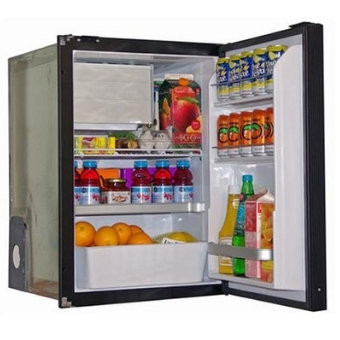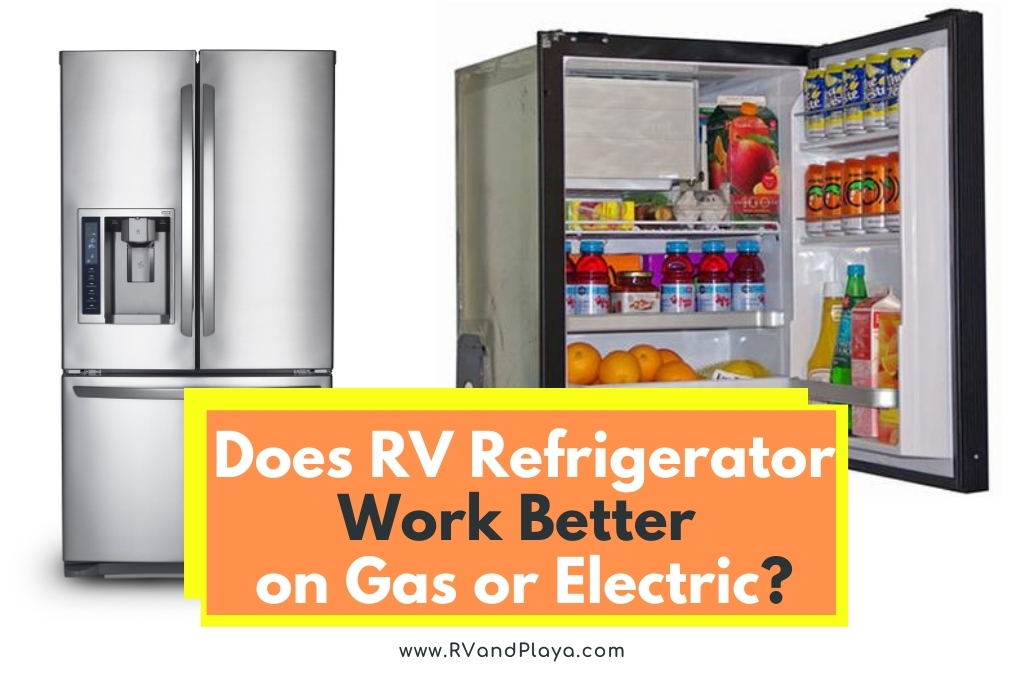Modern RVs come with all the conveniences and luxuries of a regular home these days, and this includes their refrigerators (and other appliances). RV refrigerators are important if you plan on traveling with food, beverages, frozen, or other perishable items to enjoy while camping or driving. One of the factors you may want to consider when purchasing or replacing your RV refrigeration system is whether it’s powered by gas (propane) or electricity.
Does RV refrigerator work better on gas or electric? RV refrigerators generally work better on electric than on gas. Electric RV refrigerators are also becoming more common and more popular for reasons other than performance: they’re safer, easier to use, more efficient, and they allow for more flexibility and spontaneity when traveling.
However, there are benefits and drawbacks to each type of RV refrigeration.
If you’re deciding between an electric or a gas-powered refrigerator for your RV, keep reading for an in-depth explanation of why electric RV refrigerators work better, the differences between the two, as well as some pros and cons of each.
Table of Contents
Key Differences Between Electric and Gas RV Refrigerators?
Electric RV refrigerators run on both 120-volt AC power and 12-volt DC power from a battery.
They don’t rely on fuel heating up to get their cooling power. Therefore, it’s a much quicker and more efficient cooling process than gas-powered refrigerators can provide.
Electric fridges also stay colder for longer, which means you can spend less time worrying that those steaks you’re planning to grill are not being kept at the proper temperature.
To give you a better idea of why electric RV refrigerators perform better, you have to understand the gas heating process.
Gas RV refrigerators are hooked up to a gas line, and you have to wait for that gas to heat, evaporate, interact with the other cooling elements, and then cool and regenerate.
They also rely on a 12-volt battery, and they drain the life out of the battery so quickly that it needs to be replaced pretty frequently. Basically, you’re at the mercy of time and the surrounding air temperature.

This means that in super hot conditions, like if you’re traveling in your RV across Arizona in the summer, your gas refrigerator is simply not going to be able to stay as cool as an electric one would.
It will only be able to cool to a percentage lower than the air around it (similar to air conditioning).
Another thing you need to know is that gas-powered RV refrigerators only work well when level! So, if you’re driving up a mountain, that incline is going to decrease your gas refrigerator’s performance!
Safety of Electric RV Refrigerators vs. Gas Ones?
Safety is another reason that electric RV refrigerators are becoming much more popular. If you’re only a novice or casual recreational camper, this might be the factor that appeals to you most.
Gas-powered refrigerators require a certain amount of know-how to hook up, operate, and maintain. Electric ones are more plug-in-and-go, or set-it-and-forget-it.
With a gas-powered RV refrigerator, increased motion (vibration, driving over bumps) can cause sparking, which is worrisome since propane gas is flammable.
Electric RV refrigerators use environmentally friendly refrigerants that are not flammable, and there is no gas line connected – so there’s no chance of a gas leak, and no need to worry about ventilation or flammability of incendiary gases.
All that said, many RVs will require both gas and electric power to operate the various appliances and components. Certain things will always be electric, like the AC, lights, and TV, but oftentimes the stove, heat, and hot water heater will be gas.
Those things are not always on and running though like your stocked refrigerator likely would be, so they are likely less of a hazard.
Benefits of Electric RV Refrigerators?
In addition to being safer, providing more consistent cooling performance, and being more user-friendly, electric RV refrigerators allow for more flexibility and spontaneity, which is really what you want when traveling, isn’t it?
- You don’t have to plug in the electric refrigerator a whole day before you leave or remember to allow enough time to let it power back up after disconnecting it like you do with a gas fridge.
2. Electric RV refrigerators are also more efficient. They require less energy to operate and, since they remain at more consistent temperatures regardless of environment, they don’t have big fluctuations in power usage.
3. They don’t have to work as hard to provide the level of comfort and dependability you desire.
4. One more benefit of electric RV refrigerators is that they can be powered by solar energy, so if you go off-grid and there’s no electric hookup available, but you have solar panels, you can still power your refrigerator. Solar energy can’t heat up a gas line, though.
5. One word of caution when it comes to electric appliances in an RV is to know your site’s amperage. Some hookups are 30 amps, and some are 50 – so be knowledgeable about how much power your RV requires to run everything, and don’t operate everything at the same time, or you risk blowing a fuse.
Related reading: How Many Watts Do I Need to Run a Camper AC? Facts You Need To Know
Related Questions
What Are the Costs of Gas and Electric RV Refrigerators?
what are the costfor RV refrigerators? RV refrigerators can cost anywhere between $1,000 to $3,000, depending on the type and model. There are two-way, and three-way fridges (which just refers to the number of power sources), and a few of the top brands are Norcold, Furrion, and Dometic.
Make sure to take your measurements, determine which features are important to have (do you need an ice maker?), and then shop around.
RV refrigerators are on the pricey side because they’re built with the road in mind.
They have sturdier fabrication and are more durable than their non-mobile, residential counterparts. You can buy a refurbished one to save some money,
Here is a cost comparison table to provide just a few examples:
| Brand/Model | Cost | Capacity | Power Type |
|---|---|---|---|
| Norcold DE0061R Refrigerator | $1,648.55 | 7 cu. ft. | Electric/can switch to gas |
| Dometic DM2852RB Americana Double Door RV Refrigerator | $1,498.00 | 8 cu. ft. | Gas |
| Furrion 10 cu. ft. 12V Built-In Refrigerator | $1,179.90 | 10 cu. ft. | Electric |
Can’t I Just Use a Residential Fridge or Mini Fridge in My RV?
It is not recommended to use a residential fridge in an RV. Residential refrigerators are not designed to be in motion.
They are not built as sturdy, and they have more parts because they’re only meant to be in one place. They would not handle well the constant vibration and bumps of being on the road, and would likely break early on in the journey.
Can I use a residential fridge or mini fridge in my RV? Yes, you can use redidual or mini frdge in your RV. You may need to install the right type of plugin for it, but it is convenient because you can move it outdoors to your campsite (hooked up to outdoor power) instead of constantly filling up coolers to store food and beverages.
Of course, there are technical things to consider – such as voltage, airflow specifications, etc. and you may need a generator to power it if you are off-grid camping – so be sure to do your homework to ensure this is a good way for you to save a little money.
And there you have it: electric RV refrigerators provide a big edge over gas RV refrigerators in many areas.
It’s very common now to have an RV fridge that can switch back and forth between gas and electric, which may intrigue you if you’re camping in varied environments, but the simplicity of electric refrigerators that don’t rely on gas is highly sought-after. Happy camping!
Sources:
Recent Posts
Is Toyota Remote Connect Free? (Subscription, Services Plans)
Does Toyota Remote Connect have an included trial? It used to be the case that, when you bought a new car, you made one straightforward payment and that was it. Now, it feels like there are...
Toyota Safety Connect: What It Is And Why You Need It? Whether you’re buying a new Toyota or you’ve had one for a while you will have been given the hard sell on their Connected Services but do...

